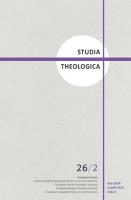Smrť Boha v myslení Friedricha Nietzscheho
The Death of God in the Thought of Friedrich Nietzsche
Author(s): Matej FerjancSubject(s): Theoretical Linguistics, History of Philosophy, History of ideas, Theology and Religion, Existentialism, Philosophy of Religion, Cultural Anthropology / Ethnology
Published by: Univerzita Palackého v Olomouci
Keywords: Death of God; Christianity; Metaphysics; Moral Interpretation of the World; Friedrich Nietzsche; Martin Heidegger
Summary/Abstract: The topic of the study is the phenomenon of the death of God in the thought of Friedrich Nietzsche and its reflection through interpretation and evaluation by the following thinkers: M. Heidegger, K. Jaspers, E. Fink, G. Deleuze and P. Kouba. Special attention is paid to the reasons and consequences of the cultural and dramatic event, which is the death of God. Attention is also focused on the personality types that are characteristic after the death of God and on the desirable and undesirable life possibilities that this event opens up. The current reception of Nietzsche’s statement “God is dead” demonstrates that his insight and justification of the consequences that flow from the death of God in the sense of the loss of Christian faith in his existence is justified. The result of the analysis is that there are consequences regarding 1) the current Western metaphysics in its onto-theological structure, 2) the loss of the guarantee of the so called moral interpretation of the world and its “benefits” for a spiritually weak person, 3) the character and spiritual level of a person to project the overall meaning of life. At the same time, in our postmodern era, some consequences of the death of God are confirmed. The argumentation confirms the legitimacy of these three consequences of the death of God. This is the main thesis of the study.
Journal: Studia theologica
- Issue Year: XXVI/2024
- Issue No: 2
- Page Range: 37-59
- Page Count: 23
- Language: Slovak

